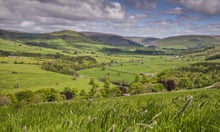Fracking in national parks should be permitted because the visual impact can be limited when the process is "done properly", the outgoing chairman of the Environment Agency has declared.
Chris Smith, who is due to step down from the post next month, waded into the debate over fracking by dismissing the claims of those campaigning against the impact of the controversial drilling at particular sites.
"Provided it is done carefully and properly regulated, those fears are definitely exaggerated," Smith said in an interview with the Times. He went on to reject the arguments of other anti-fracking campaigners who want to see greater emphasis placed on developing renewable energy sources rather than another fossil fuel.
"I don't agree with that analysis because we aren't yet ready to see 100% of our energy requirements being produced from renewables," he said.
"Over the next 10-20 years we are going to have to use fossil fuels still and it's much better to use gas than coal."
However, it is Smith's remarks on national parks and fracking that are most likely to draw the ire of anti-fracking campaigners.
He said: "I wouldn't rule it out because provided it's being done properly, the visual impact can be very limited indeed. It will depend on any individual location."
Environmental groups such as Greenpeace have accused the government of preparing to "auction off" national parks and areas of outstanding natural beauty like the Cotswolds to fracking firms.
In May, anti-fracking campaigners claimed victory after an energy company abandoned its plans to drill beneath their homes in the South Downs national park.
Celtique Energy has told residents it will not drill horizontally under their land, though it will push ahead with a vertical well at its own site.
The development, which followed a "legal blockade" by the local landowners around the site, is the latest in a growing controversy over underground drilling for shale gas. However the landowners' victory may be shortlived – ministers intend to change the trespass law that allows owners to refuse permission for drilling under their land, despite opposition from three-quarters of the public.
More than 45,000 people around the country have joined legal moves to use trespass laws to block energy companies from fracking under their properties.
In an interview with the Guardian in April, Dame Helen Ghosh, director general of the National Trust, said the trust would not allow fracking on its land. When asked why not, she said: "because we don't believe anyone understands the environmental impacts. And because we as far as possible would want to avoid anything that encourages the continued use of fossil fuels."











Comments (…)
Sign in or create your Guardian account to join the discussion